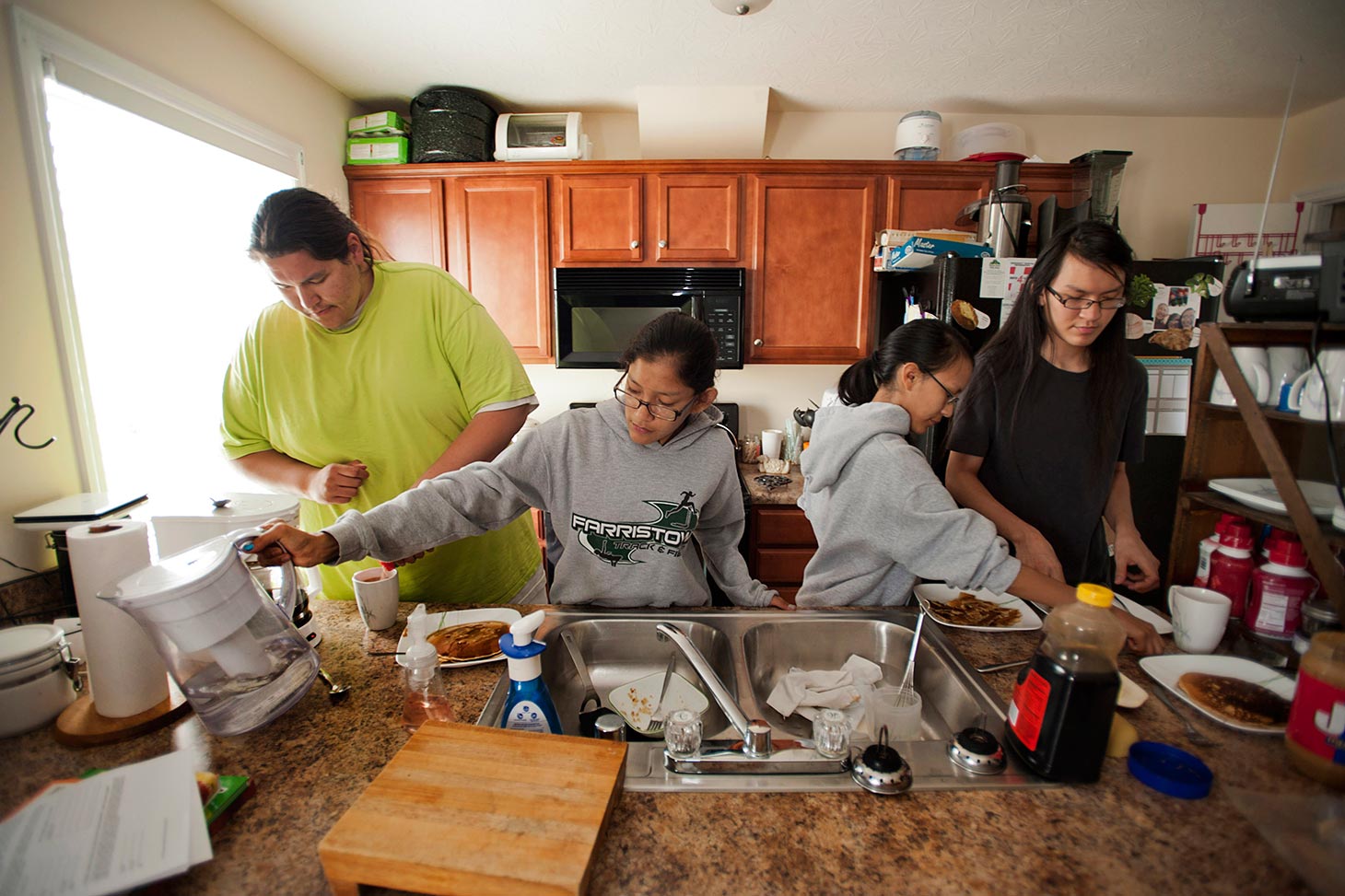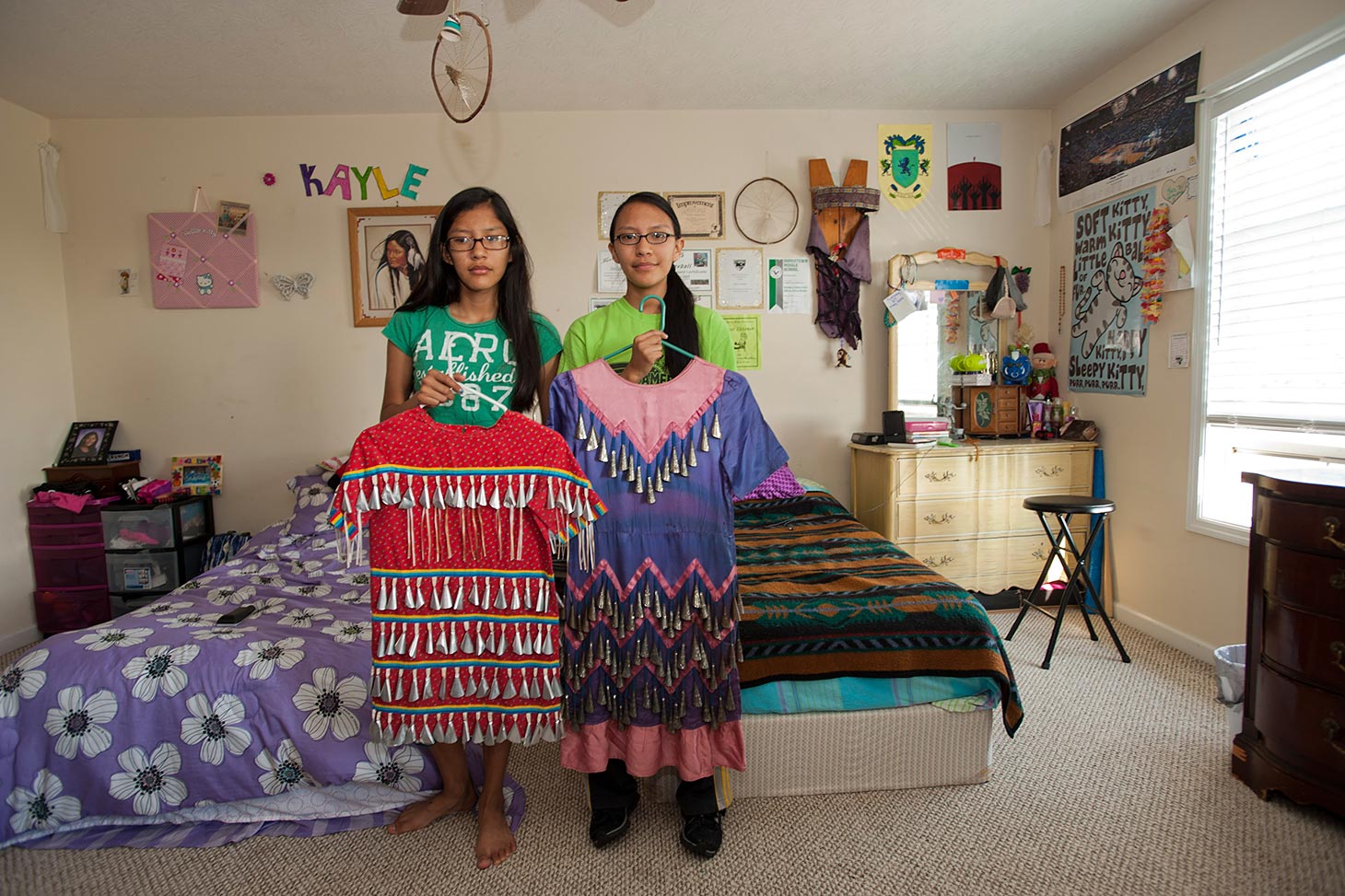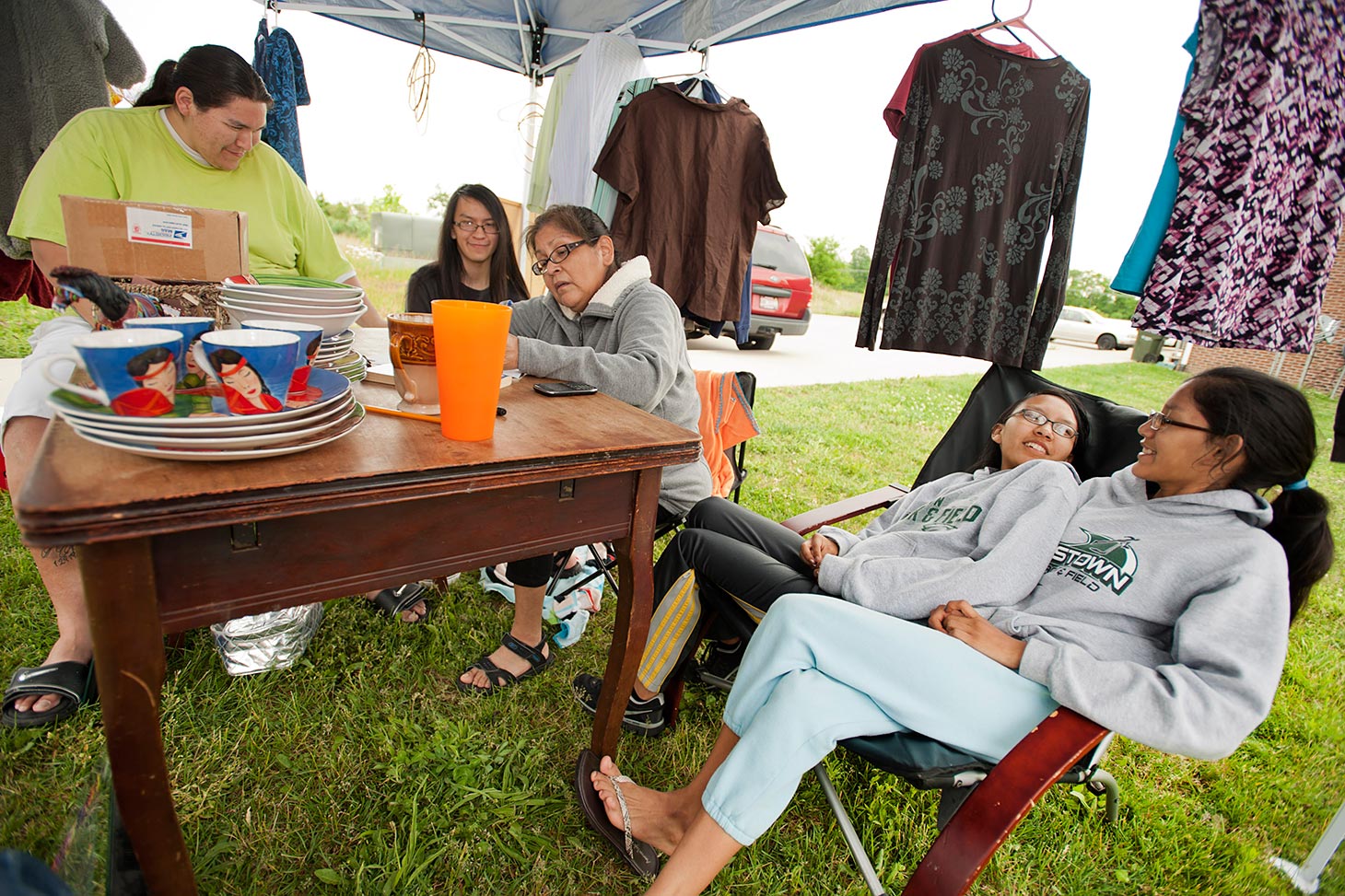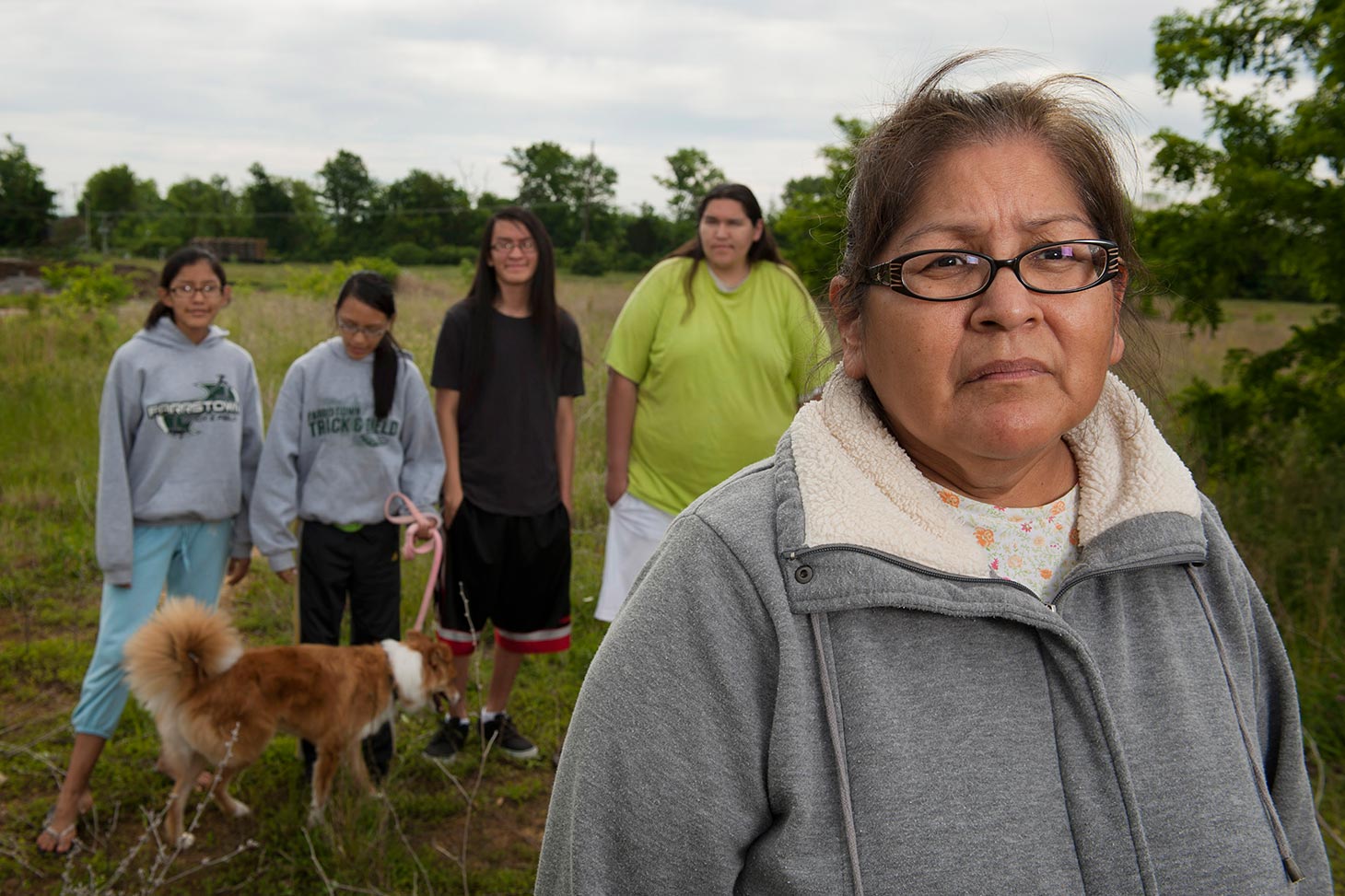Some 50 million Americans live below the official poverty line, and millions more are barely making ends meet. This series explores how people try to survive.
A decade ago, Sonya Begay fell into a second round of parenting. Her oldest son, Ruben Eppele, was struggling with drug addiction and temporarily lost custody of his three children to Kentucky’s foster care system. The kids — Damian, now age 16; Lea, 15; and Kayle 13 — are Navajo like their father and grandmother and should have been placed with Begay or another relative in accordance with the Indian Child Welfare Act. But it was almost a year before she could sort things out in court and take them home.
Begay and her son shared custody of Damian, Lea and Kayle for the next several years, and when she relocated from rural Richmond to Washington, D.C., for a job, the children moved with her. In 2010, she was raising them and working long hours as a policy analyst for the Department of Labor when she learned that Ruben had been murdered in Kentucky. Begay decided to leave her job and take the children back to Richmond. "I was gone [at work] 12 hours a day, so to be away from them while they’re in their grief, while I’m in my grief, you can’t do that," she says.
Begay has since shepherded her grandkids through school, therapy and sports, but four years later, she remains unemployed. When the children are at school, Begay scours the Internet and calls old contacts to ask about job openings, volunteers in the Native American community and helps other "grandparents as parents." Her middle son, Shawn Cote, 27, is currently staying with the family to provide extra support. "You don’t want your grandchildren to be raised by someone else," Begay says. "Here in Kentucky, you raise your own. Taking on three children is a lot for me, but that’s the sacrifice I’ve had to make."
Income: While at the Department of Labor, Begay earned $75,000 a year. Now, she, Damian, Kayle and Lea live on the children's Social Security survivors benefits of about $3,000 per month. The household's income is too high to qualify for food stamps, but low enough to qualify for public health insurance. "I was making good money in D.C. and now, all of a sudden, we’re at the poverty line over here," Begay says.
Scrimping, not saving: Begay leans on cost-saving strategies: "Some of the things I do now are couponing a lot, also buying in bulk and then economizing — repackaging [in smaller portions]. If [we go to a movie], it’s a matinee with coupons."
Interaction before Internet: The family puts conversation before computer screens. "By the time [the kids] get home, about 4, we start preparing dinner. We sit down and eat and talk about our day," Begay says. "These kids, they don't request a lot of things. We don’t have cell phones for them. Things other children at school have, they understand that's not a necessity."
In January, we published "America’s have-nots: what it means to be poor" and heard from many readers living below and above the official poverty level. Russ Bowers from California had a compelling story to tell, so we followed up with him. Other readers submitted the stories below.
Submit your story at the bottom of this page.
Sometimes I'm convinced that the stigma of poverty is worse than the actual conditions. In this country it's assumed that if you're poor, you've somehow earned it/deserve it ... Living in poverty has been and continues to be, an intense as well as an invaluable education. My life is rich and happy.
I had a good job but lost it in the crash of 2008 ... I was an artist before ... so if I can get a little money, I buy art supplies.
I had a good job but lost it in the crash of 2008. Since millions were losing their jobs and I was in a bad demographic (female, over 57) I never was able to get a good job again. I was an artist before I was a non-profit director, so if I can get a little money, I buy art supplies.
— Jeanine Mordon
I live month to month, and I'm broke most of the time.
I live on $12,432 per year and Social Security retirement. I live month to month, and I’m broke most of the time. If it weren’t for HUD housing, VA medical, Vets Assistance, in Lake County, IL, food pantries, Food Stamps, Catholic Charities and friends who live at my present poverty level — we mutually help each other to get by — I would not make it. Each of these programs or parts is essential in my survival. If only one piece were missing, I would be very hungry and homeless. My VA medical healthcare saved my life in 2013. I’m chronically ill from diabetes, hypertension, non-allergic rhinitis, chronic bronchitis and other problems, but I manage as long as I spend every dollar wisely.
— Brian McCarthy, North Chicago, Ill.
I was living paycheck to paycheck, and essentially still am living that way ... It’s bittersweet, because I finally made it after working so hard through college and through a long drought of under-employment, and now that I’m here, I’m still living the same way, and will continue to do so for years until the loans are paid off.
I have been surviving by eating cheap canned food, using a pre-pay phone for emergencies only, and only watching TV with an antenna. I communicate with only the internet and an old computer. Thankfully I’m finally employed at my skill level, and I’m now making more money. But before I was making $8.50/hr (up from minimum wage before), and have had to pay a minimum payment on multiple student loans for my bachelor degree and a credit card that I used for car repairs and food while I was in college. In Virginia, I made too much to qualify for food stamps. That made paying for food, rent, gas for the car (an old beater) and bills barely possible. I was living paycheck to paycheck, and essentially still am living that way, except since making more money with a job more tailored to my college degree, I’ve been using the extra income to pay off the credit card and start on the loans. It’s bittersweet, because I finally made it after working so hard through college and through a long drought of under-employment, and now that I’m here, I’m still living the same way, and will continue to do so for years until the loans are paid off.
— Ryan, Lynchburg, Va.
Learn to cook and take good advice from the grandmothers among us. They lived in depression-times and made do. We can learn these skills again.
I am living at poverty level having been without a job for over a year. Firstly, I grow our own salad greens and a few herbs. In pots. I compost our kitchen waste to make good soil and do not buy bags of it. In winter I grow sprouted seeds. Farmers markets are too expensive here and the food miles to bring fresh produce to the city range from 50 to 300 miles. Urban foraging has given us jams and jellies that I make. I know how to stretch one chicken into 7 days of meals feeding four people. No pre-packaged food comes into our household. I shop the produce aisle and skip the rest. I am lucky because there are stores within 2 miles walking distance — we do not live in a food wasteland. I also stock up on tinned tomatoes, dried beans, et al. On sale. Learn to cook and take good advice from the grandmothers among us. They lived in depression-times and made do. We can learn these skills again.
— Robyn, Los Angeles
For seven years I lived on $500 a month.
For seven years I lived on $500 a month. The cost of taxes on my small home was over $200 monthly. Volunteering was the only "recreation" I could afford. I feel rich when I have food.
— Sharon Dory, Mendocino County, Calif.
We invite all of you to share your experiences with us — via the form below, via email (ajam.community@aljazeera.net) or by posting in the Al Jazeera America Poverty Community on Facebook.







I was raised in the middle class but have raised my own children in poverty, albeit American style. Sometimes I'm convinced that the stigma of poverty is worse than the actual conditions. In this country it's assumed that if you're poor, you've somehow earned it/deserve it — That you're lazy, lacking intelligence or savvy,or simply doing something wrong. Or perhaps just "a loser," reaping what you've sown. Living in poverty has been and continues to be, an intense as well as an invaluable education. My life is rich and happy, for the most part. Despite having left the consumer class two decades ago.
— Lisa Anthony, Iowa City, Iowa